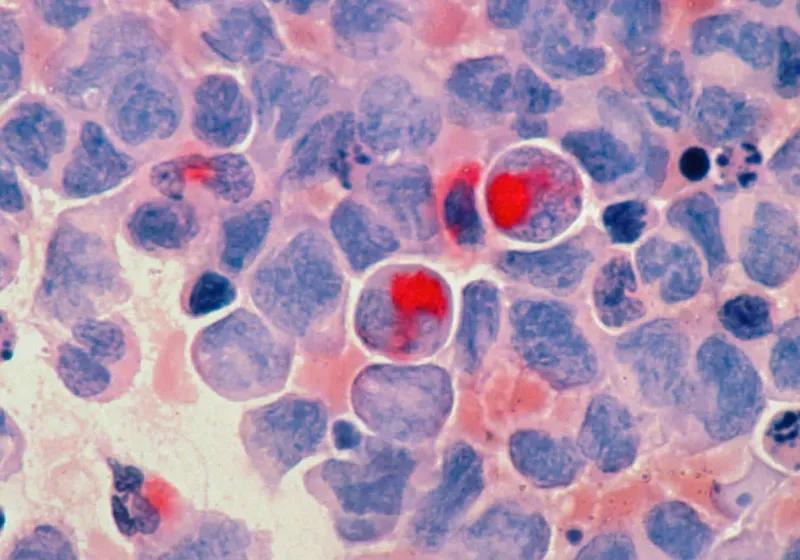Harvard's CHIEF AI Model Achieves 96% Accuracy in Multi-Cancer Diagnosis and Prognosis
2 Sources
2 Sources
[1]
New AI Model Developed by Harvard Detects Cancer With 96% Accuracy - Decrypt
Researchers at Harvard Medical School have unveiled a new AI model called CHIEF (Clinical Histopathology Imaging Evaluation Foundation) that can diagnose and predict outcomes for multiple cancer types with remarkable accuracy. According to the study, CHIEF outperforms existing AI systems, achieving up to "96% accuracy" in cancer detection across 19 different cancer types. The researchers liken the versatility of CHIEF to that of ChatGPT, the language model that has captured widespread attention for its ability to tackle a wide range of tasks. CHIEF is basically a very specialized AI Vision model -- a model capable of understanding visual inputs -- trained to be super detailed in images of cancer cells instead of the generalist approach we see in traditional models like GPT-4V or LlaVA. So instead of being trained to recognize general elements like "cats" or "oranges," CHIEF was trained on a massive multimodal dataset, including 15 million unlabeled images and 60,000 whole-slide images of tissues from 19 different anatomical sites. "Through pretraining on 44 terabytes of high-resolution pathology imaging datasets, CHIEF extracted microscopic representations useful for cancer cell detection, tumor origin identification, molecular profile characterization and prognostic prediction," the research reads. The approach seems to work better than expected. "Our ambition was to create a nimble, versatile ChatGPT-like AI platform that can perform a broad range of cancer evaluation tasks," said study senior author Kun-Hsing Yu. "Our model turned out to be very useful across multiple tasks related to cancer detection, prognosis, and treatment response across multiple cancers." The researchers tested CHIEF on over 19,400 images from 32 independent datasets collected globally, and it outperformed state-of-the-art AI methods by up to 36.1% across these tasks. It was also more accurate at separating patients with high and low survival rates, and was able to provide accurate insights of different analyzed tissue samples. The researchers plan to further refine CHIEF by training it on images of rare diseases, non-cancerous conditions, and pre-malignant tissues to improve its accuracy. They also expect to feed the model with more data so it gets better at identifying cancer aggressiveness and predicting the effects of novel treatments. Researchers have been leveraging AI to advance the detection, diagnosis, and treatment of cancer and other diseases for a while now. For example, researchers from Cambridge introduced EMethylNET, an AI model that uses DNA data from tissue samples to detect 13 types of cancer with a 98% accuracy rate. Trained on over 6,000 tissue samples, EMethylNET highlights the potential of AI in identifying cancer early through DNA methylation, which plays a crucial role in cancer growth. Another earlier model named CancerGPT (we're not making that name up) used a large language model to predict how drug combinations may affect rare tissues in cancer patients. It demonstrated that pre-trained models can be invaluable when structured data and samples are scarce. CancerGPT is able to generalize predictions and leverage prior medical research to offer significant insights, although researchers were still concerned about potential AI hallucinations. Google and iCAD also teamed up to use AI to enhance cancer screening. Their AI-powered system outperformed expert radiologists in accuracy, offering a viable solution amid a global shortage of radiologists and improving accessibility to life-saving breast cancer screenings. And finally, another AI technology named Sturgeon is being used by brain surgeons to assist in diagnosing central nervous system tumors in real-time with 90% accuracy.
[2]
Harvard Study Shows 96% Accuracy in ChatGPT-Like AI for Cancer Diagnosis
This is the first foundation AI model for pathology-based diagnosis to predict and validate patient outcomes across international groups. Researchers at Harvard Medical School have developed a versatile AI model, similar to ChatGPT, that can perform a wide range of diagnostic tasks across various types of cancer. The new model, CHIEF (Clinical Histopathology Imaging Evaluation Foundation), was trained on 15 million image sections and 60,000 whole-slide tissue images from various organs for more comprehensive analysis. The researchers noted that the new AI system surpasses current methods by handling a wider range of tasks and being tested on 19 cancer types, offering flexibility similar to large language models like ChatGPT. The research team noted that the findings support growing evidence that AI can help clinicians evaluate cancers more efficiently and identify patients who may not respond to standard therapies. "Our ambition was to create a nimble, versatile ChatGPT-like AI platform that can perform a broad range of cancer evaluation tasks," said Kun-Hsing Yu, senior author of the study and assistant professor at Harvard Medical School. The researchers plan to improve CHIEF by training it on rare diseases, non-cancerous and pre-malignant tissues, and incorporating more molecular data. They also aim to enhance its ability to predict the benefits and side effects of both standard and novel cancer treatments. "If validated further and deployed widely, our approach, and approaches similar to ours, could identify early cancer patients who may benefit from experimental treatments." he added, empahsising on how targeting specific molecular variations is a capability not universally available worldwide. Cancer detection CHIEF achieved nearly 94 percent accuracy in cancer detection and significantly outperformed current AI approaches across 15 datasets containing 11 cancer types including esophagus, stomach, colon, and prostate. The team's latest work expands on Yu's previous research in AI for cancer evaluation. Tested on 19,400 images from 32 datasets across 24 hospitals, CHIEF outperformed other state-of-the-art AI methods by up to 36 percent on the following tasks: cancer detection, tumor origin, outcome prediction, and gene identification. Its versatility allows it to perform equally well across different clinical settings, regardless of how tumor samples were obtained or digitised. Google's AI detects breast cancer in anonymised screenings with greater accuracy and fewer false negatives or positives than human experts. MIT researchers at the Jameel Clinic for Machine Learning and the Computer Science and Artificial Intelligence Laboratory (CSAIL) developed an AI model that can detect breast cancer up to five years before clinical diagnosis. Back home, Indian Institute of Technology Madras (IIT Madras) researchers developed an Artificial Intelligence-based tool, 'PIVOT', that can predict cancer-causing genes in an individual.
Share
Share
Copy Link
Harvard Medical School researchers have developed CHIEF, a versatile AI model for cancer diagnosis and prognosis, achieving up to 96% accuracy across 19 cancer types. This ChatGPT-like model outperforms existing AI systems in various cancer-related tasks.

Harvard Unveils Groundbreaking AI Model for Cancer Diagnosis
Researchers at Harvard Medical School have developed a revolutionary AI model named CHIEF (Clinical Histopathology Imaging Evaluation Foundation) that demonstrates remarkable accuracy in diagnosing and predicting outcomes for multiple cancer types
1
. This versatile model, likened to ChatGPT in its adaptability, has achieved up to 96% accuracy in cancer detection across 19 different cancer types, outperforming existing AI systems2
.CHIEF's Unique Approach and Training
Unlike general-purpose AI vision models, CHIEF is a specialized model trained specifically on cancer cell images. The model was trained on an extensive multimodal dataset, including:
- 15 million unlabeled images
- 60,000 whole-slide images of tissues from 19 different anatomical sites
- 44 terabytes of high-resolution pathology imaging datasets
This specialized training allows CHIEF to extract microscopic representations crucial for cancer cell detection, tumor origin identification, molecular profile characterization, and prognostic prediction
1
.Impressive Performance and Versatility
CHIEF's performance has exceeded expectations, demonstrating its ability to handle a wide range of cancer evaluation tasks. When tested on over 19,400 images from 32 independent datasets collected globally, CHIEF outperformed state-of-the-art AI methods by up to 36.1% across various tasks
1
. These tasks include:- Cancer detection (94% accuracy)
- Tumor origin identification
- Outcome prediction
- Gene identification
The model also showed superior accuracy in separating patients with high and low survival rates and provided accurate insights into different analyzed tissue samples
2
.Related Stories
Future Developments and Potential Impact
The research team, led by senior author Kun-Hsing Yu, plans to further refine CHIEF by:
- Training it on images of rare diseases, non-cancerous conditions, and pre-malignant tissues
- Incorporating more molecular data
- Enhancing its ability to predict the benefits and side effects of both standard and novel cancer treatments
2
If validated and widely deployed, CHIEF could potentially identify early-stage cancer patients who may benefit from experimental treatments, addressing a capability not universally available worldwide
2
.AI in Cancer Research: A Growing Trend
CHIEF is part of a broader trend of leveraging AI in cancer research and diagnosis. Other notable developments in this field include:
- EMethylNET: An AI model using DNA data to detect 13 cancer types with 98% accuracy
1
- CancerGPT: A large language model predicting drug combination effects on rare tissues in cancer patients
1
- Google and iCAD's AI-powered system for enhancing breast cancer screening
1
- Sturgeon: An AI technology assisting brain surgeons in real-time diagnosis of central nervous system tumors
1
- MIT's AI model for detecting breast cancer up to five years before clinical diagnosis
2
- IIT Madras' 'PIVOT' tool for predicting cancer-causing genes in individuals
2
As AI continues to advance in the field of cancer research and diagnosis, tools like CHIEF demonstrate the potential for more accurate, efficient, and accessible cancer detection and treatment strategies worldwide.
References
Summarized by
Navi
Related Stories
Recent Highlights
1
ByteDance's Seedance 2.0 AI video generator triggers copyright infringement battle with Hollywood
Policy and Regulation

2
Demis Hassabis predicts AGI in 5-8 years, sees new golden era transforming medicine and science
Technology

3
Nvidia and Meta forge massive chip deal as computing power demands reshape AI infrastructure
Technology








